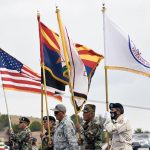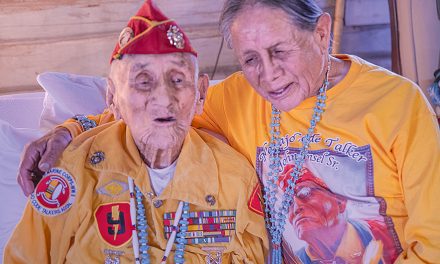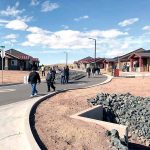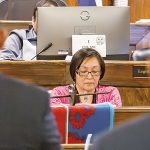
Council slam-dunks billion-dollar ARPA bill
WINDOW ROCK
It happened so fast you might not have noticed if you weren’t paying close attention.
After almost a year of discussion and political wrangling, the Navajo Nation Council appropriated the remaining $1.1 billion in American Rescue Plan Act funds.
The vote was called as the first thing on the morning of June 30 during the fourth special session called to wrestle with the bill.
This happened after a “cease debate” motion by Delegate Edison Wauneka was fast-tracked with the support of Speaker Seth Damon. The vote on the bill was pushed through even though some delegates still had proposed amendments on the docket.
Within an hour of the start of the session, the ARPA bill was approved, 20-2, with delegates Eugenia Charles-Newton and Amber Kanazbah Crotty voting against.
“In my opinion, the legislation was ramrodded through the process,” said Charles-Newton. “I did try to challenge this decision with a point of privilege.”
The speed with which the bill passed was out of the ordinary and suggested the possibility of prior planning among delegates to orchestrate the vote in advance of the July 4th holiday weekend.
Prepared by the president’s office and sponsored by Delegate Mark Freeland, with four amendments, the bill includes funding for the following priorities (per the speaker’s office):
- $211.2 million for chapter projects (to be determined) divided equally by 24 delegate regions ($8.8 million).
- $96.4 million for home electricity connections.
- $225 million for water and wastewater projects.
- $109.8 million for internet broadband connections.
- $145.5 million for housing construction, including veteran and Bennett Freeze housing.
- $150 million for bathroom additions.
- $120 million for new Hardship Assistance applications.
- $40 million for E911, rural addressing and cyber security upgrades.
- $19.2 million for transitional housing and detox centers.
Of the $2.079 billion in ARPA funding the Nation received in 2021 to respond to negative impacts of the COVID-19 pandemic, more than $1 billion was already appropriated for Hardship Assistance ($557 million), Sihasin Fund and Unreserved, Undesignated Fund Balance project reimbursements ($76.6 million), refunded CARES Act projects ($167.6 million), and Navajo Nation government ARPA administrative/regulatory support ($207.9 million).
‘Monumental moment’
“This is a monumental moment for the Navajo people,” said President Jonathan Nez, who is running for re-election and spent the holiday weekend going from one Fourth of July event to another, touting the swift passage of the bill.
“Never in the history of our government have we invested this amount of funding to provide running water, electricity to homes, broadband connectivity, housing for families and veterans, and many more critical services for our people,” Nez said in a June 30 press announcement.
Similarly, in a press release from the speaker’s office that did not mention the “cease debate” or Charles-Newton’s challenge, Damon said the Navajo Nation is now “ready to rebuild, construct, and create thousands of new jobs.”
However, with an estimated need of more than $20 billion for Navajo Nation infrastructure projects, even the ARPA funds can only go so far.
“We did our best to bring the executive and legislative branches together to hear concerns and find a compromise,” said Delegate Wilson Stewart.
But many were shocked at how quickly the vote took place and sailed through Council after months of careful consideration for every delegate’s wishes.
Charles-Newton said she was prepared to propose several amendments including $15.8 million for the judicial branch to help address a backlog of cases, additional special duty/premium pay for front-line workers, and assistance for farmers that she said Council knew about.
Delegate Carl Slater, who sponsored the first amendment to the bill that included a compromise to provide an increased amount of unencumbered funds ($8.8 million) for each of the 24 legislative districts, missed the special session due to an illness.
He told the Navajo Times on Friday he believes all delegates should have had the chance to offer amendments no matter how long it took.
“I wish they hadn’t done that,” he said, referring to the Council’s vote for the cease debate.
Charles-Newton’s challenge to the cease debate was voted down, 14-6. Six delegates voted green to support the challenge that would have kept the session going, including Nathanial Brown, Janie Henio, Vince James, Otto Tso and Charlaine Tso.
After that, 15 delegates voted in favor of the “cease debate,” with six delegates, Charles-Newton, Amber Kanazbah Crotty, Jamie Henio, Vince James, Otto Tso and Charlaine Tso voting against.
“I had an amendment – that’s the reason I voted against the cease debate,” Delegate Otto Tso told Navajo Times on Friday. “But it is what it is. The votes weren’t there to even try to influence it.”
“So when the main motion came up, we were just out-numbered,” he said.
He said the bill that passed is “a lot better” than the president’s prior proposed bill, which failed to pass after months of discussion leaving the more than $1 billion sitting unspent and unencumbered as inflation has skyrocketed, construction prices have risen, and the value of the funding has gone down in relative terms.
‘People’s money’
With the bill passed, Freeland said projects in the approved bill will immediately start working to confront the Navajo people’s disparities in living conditions that made them even more vulnerable during the COVID-19 pandemic.
“This historic action by my colleagues of the Navajo Nation Council addresses the urgent needs of the communities we represent,” said Freeland.
He said the ARPA funds are the “Navajo people’s money” and they deserve immediate support.
Delegate Daniel Tso said, “We made many attempts to get as much ARPA funds to bring the most quality-of-life enhancements of water and electric connections to our community members.
“This compromise action begins the boots on the groundwork construction for 110 chapters,” he said.
According to documents provided to Council by the president’s office, the breakdown of amounts for infrastructure project by delegate region are:
- Nathanial Brown, $26 million.
- Charlaine Tso, $19.7 million.
- Eugenia Charles-Newton, $15.7 million.
- Amber Kanazbah Crotty, $22.4 million.
- Seth Damon, $19.1 million.
- Daniel Tso, $24.1 million.
- Herman Daniels, $22.2 million.
- Edmund Yazzie, $17.1 million.
- Elmer Begay, $23.2 million.
- Eugene Tso, $37.1 million.
- Mark Freeland, $42.6 million.
- Pernell Halona, $29.8 million.
- Jamie Henio, $23.4 million.
- Vince James, $25.6 million.
- Kee Allen Begay, $15.9 million.
- Rickie Nez, $14.4 million.
- Otto Tso, $14.8 million.
- Paul Begay, $21.3 million.
- Carl Slater, $22 million.
- Raymond Smith, $18.3 million.
- Wilson Steward, $13 million.
- Thomas Walker, $29 million.
- Edison Wauneka, $11.8 million.
- Jimmy Yellowhair, $21.9 million.
These amounts are for construction-ready projects that were proposed by the president’s office and were reviewed and approved by the Department of Justice.
‘Long, hard fight’
Delegate Kee Allen Begay said allocating the ARPA funds was a “long, hard fight” for communities in the more rural parts of the Nation.
“Much work needs to be done and I’m here making sure projects are completed,” said Begay. “To my community, I’ll continue to advocate for additional funds!”
Charles-Newton said she is “flabbergasted” that the Council did not provide money to the third branch of government in the new ARPA bill.
“No money – zilch, nada, nothing – was given to our third branch — the judicial branch,” she told Navajo Times. “What I worry about is, how long will people have to wait to get justice?”
“How long will people have to wait to get their probated cases addressed?” asked Charles-Newton. “How many lawbreakers will be let loose because the courts don’t have the manpower or money to address criminal cases?”
Delegate Vince James said prioritizing the $1 billion was difficult because there was no “equalization” of funds even though the pandemic impacted every part of the Navajo Nation.
“I really do hope that every Navajo family will be served by the promising projects that were listed in the legislation that we voted on,” he said.
The president’s office has defended the project allocations in the bill, stating that it worked closely with “technical experts” to write the bill based on meetings with many communities along with supporting resolutions from chapters and agency councils.
“This is the most comprehensive infrastructure package ever developed by the Navajo Nation,” said Paulson Chaco, chief of staff for the president’s office. “Our team kept fighting for the Navajo people because we know what they experience every day because of COVID-19.”
Once certified by Damon, President Jonathan Nez will have 10 days to sign or veto the bill, which is expected to happen since he has been pushing for its passage.
Information: www.navajonationarpa.org
As a public service, the Navajo Times is making all coverage of the coronavirus pandemic fully available on its website. Please support the Times by subscribing.
How to protect yourself and others.
Why masks work. Which masks are best.
Resources for coronavirus assistance








 Highway 264,
Highway 264, I-40, WB @ Winslow
I-40, WB @ Winslow